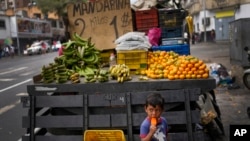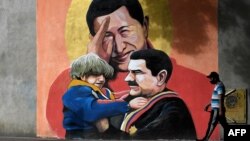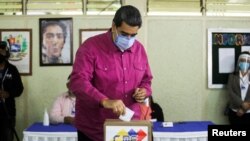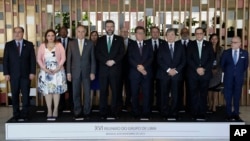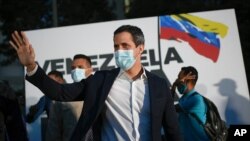Recent minor changes in the relationship between the United States and Venezuela may signal that a greater degree of engagement between the two countries is possible in 2023, though experts remain doubtful that the Biden administration’s goal of seeing free and fair presidential elections there in 2024 is likely to be achieved.
U.S. oil firm Chevron this month took over operations at a major Venezuelan oil processing facility after the Treasury Department granted a limited license for the firm to import a small amount of Venezuelan crude oil into the U.S. Chevron is currently involved in four petroleum projects in the country.
The announcement of the lease came as representatives of the regime of Nicolás Maduro, whose presidency is disputed by the country’s opposition and not recognized by Washington, reached an agreement with opposition leaders on humanitarian aid. The deal will allow the United Nations to oversee the use of Venezuelan funds, frozen overseas by U.S.-led sanctions, to pay for humanitarian relief in the country totaling, by some estimates, roughly $3 billion or more.
Beginning of changes?
The oil leases and the unfreezing of funds for humanitarian aid, together, represent tiny cracks in the wall that has gone up between the U.S. and Venezuela in recent decades. Major obstacles remain to any meaningful rapprochement, and significant changes to the political landscape, both within Venezuela and in South America more broadly, significantly complicate an already difficult situation.
Still, a growing recognition that neither sanctions nor international backing for an interim government headed by Maduro’s chief political rival have produced positive change for the people of Venezuela may be forcing a reassessment of existing policies.
Another major factor is that Russia’s invasion of Ukraine has thrown global energy markets into turmoil, making Venezuela’s huge oil reserves an enormously attractive resource for both the U.S. and its allies in Europe.
“Although U.S. government officials have insisted that U.S. policy towards Venezuela hasn’t changed, we have seen some evident changes,” Diego Area, deputy director for strategic development at the Atlantic Council’s Adrienne Arsht Latin America Center, told VOA. “I do believe that looking at 2023 we’ll see increased engagement between the U.S. and Venezuela.”
History of conflict
The U.S. relationship with Venezuela has been fraught since at least 1999, when former military officer and socialist firebrand Hugo Chavez assumed power after winning the country’s presidential contest promising to implement far-reaching leftist reforms. Chavez and Maduro, who took over the country when Chavez died in 2013, made opposition to the U.S. a signature element of their foreign policy, including, in Chavez’s case, after a failed 2002 coup attempt against him that some observers contended Washington was slow to condemn.
The relationship soured further in January 2019, after Maduro disputed the results of a presidential election held a month earlier and refused to cede power. The United States and dozens of other countries refused to recognize him as the legitimate president of Venezuela, throwing their support instead behind opposition leader Juan Guaidó, who much of the international community accepted as the true victor in the election.
In 2020, Maduro held parliamentary elections that were decried as a sham by the U.S. and many other countries. Since then, the U.S. has continued to recognize the previous parliament, elected in 2015, as the legitimate legislative body in the country, and has recognized Guaidó as Venezuela’s interim president.
Punishing sanctions led by the U.S. have frozen overseas assets and have severely restricted the Maduro regime’s ability to sell oil on the open market — a major economic blow to a country with the world’s largest proven oil reserves.
Partly because of sanctions and partly because of economic mismanagement by the Chavez and Maduro regimes, the Venezuelan economy has shrunk dramatically, plunging millions into poverty and pushing millions more to leave the country, many seeking asylum in countries across Latin America and in the U.S.
Maduro, however, has maintained his grip on the country, and there are now reasons to believe that his position in the region is stronger than it has been in years.
Lima Group fragmented
In 2017, a group of primarily South American countries formed what became known as the Lima Group, in hopes of finding a way to end ongoing turmoil in Venezuela, which had spent three years wracked by riots over economic conditions and the repressive tactics of Maduro’s government.
When Maduro refused to cede power to Guaidó in 2019, the Lima Group formally denounced him and recalled ambassadors from the country.
Since then, however, changes in the leadership in a number of South American countries have resulted in multiple members of the Lima Group indicating a willingness to recognize Maduro once again. Argentina and Mexico left the group in 2021, and that same year Peru moved to recognize the Maduro government.
In particular, the replacement of center-right governments in neighboring Colombia and Brazil with left-leaning leaders has also led to a regional thaw toward Maduro. Colombian President Gustavo Petro has reopened his country’s borders with Venezuela and Luiz Inácio Lula da Silva, Brazil’s president-elect, has indicated that he intends to reestablish relations with Maduro as well.
“It makes life harder for the U.S., because Maduro’s 2023 goal is recognition — appearing as though countries are normalizing with him,” Ryan Berg, director of the Americas Program at the Center for Strategic and International Studies, told VOA.
“Having Lula normalize relations, having Petro meet with Maduro and opening the border, that plays into the narrative that Venezuela is becoming a normal country again,” he said. “So, if you’re the regime, looking out on the region, you feel much better about your situation today than you would have in 2019 or 2020, when the region was mostly center-right, and a lot of countries didn’t recognize you.”
Guaidó seen as weaker
Guaidó has been unable to translate international recognition as the legitimate leader of Venezuela and access to some of the country’s frozen funds into meaningful change on the ground in his country, and there are signs that his support among other opposition figures is waning.
In public statements over the past several months, leaders of major factions within the opposition have signaled a willingness to explore alternatives to the current interim government, which would result in Guaidó losing his position as interim president.
In comments to the McClatchy news service in October, a Biden administration official was quoted as saying, “The United States continues to recognize Juan Guaidó as the interim government of Venezuela,” but added, “If the Venezuelan opposition decides to do away with the interim government, it is their decision.”
The Biden administration excluded Venezuela from June’s Summit of the Americas in Los Angeles.
Limits of the possible
All in all, it seems like a recipe for possible change in Washington’s approach to Caracas, though it remains unclear what that change might look like.
“There seems to be considerable frustration with the fact that earlier policy efforts have so far not succeeded,” Patrick Duddy, who served as U.S. ambassador to Venezuela from 2007 to 2010, told VOA.
Duddy said that it may be time to recognize that the goal of using sanctions to pressure the Maduro regime into allowing elections that it might lose, is not necessarily a realistic one.
“Among other factors, given that the United Nations has highlighted the very dire human rights situation [in Venezuela] and even suggested that there are those in the regime who are likely guilty of crimes against humanity, suggests that those elements of the regime are going to be very reluctant to give up the protections the come with being part of the government,” Duddy said.
A process, not a moment
Area, of the Atlantic Council, agreed. “I doubt that any election that will really contest Maduro’s power is viable in Venezuela.”
However, Area said that he believes there may be a way to persuade the Maduro regime to loosen some controls in a way that allows for broader representation without directly threatening the regime.
“The implicit goal is to rebuild capacity in civil society organizations, promote greater alignment among opposition parties, and strengthen their capacities and of the traditional Democratic political parties in preparation for the future,” he said.
Berg, of the Center for Strategic and International Studies, said that he believes that the Biden administration has accepted the fact that any shift toward democracy in Venezuela is going to be, at best, incremental.
While Maduro is unlikely to agree to major changes, Berg said, it might be possible to persuade him to allow small reforms that would, nevertheless, improve the lives of Venezuelans.
“I think the administration sees this as a transition in the truest sense of that term, not as a discrete moment in time, where all of a sudden, you’re going to have a flash of light and there’s a democracy,” he said. “This is going to take a long time, and it’s going to be a process.”

